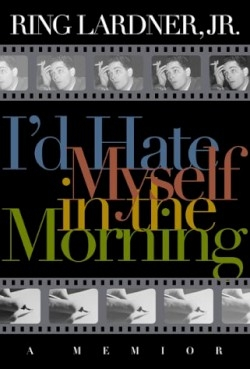I'd Hate Myself in the Morning
A Memoir
The son of famous newspaper writer, this author began to serve a nine-month sentence in 1950 for refusing to answer congressional questions about his political beliefs. This was the McCarthy era before McCarthy had arrived on the scene. A Hollywood screenwriter, Lardner, Jr. would become one of the famous/infamous Hollywood Ten whose careers would grind to a halt due to the studios’ blacklist of Communist Party affiliates.
I’d Hate Myself in the Morning offers an account of the author’s life, with memories of growing up in the Lardner household, of Hollywood during the 1940s, and of the uphill battle against the blacklist in the 1960s. Many celebrities pass through these pages including F. Scott Fitzgerald, Katherine Hepburn, Carole Lombard, Darryl F. Zanuck, and the author’s father, Ring Lardner, Sr.
When asked by Chairman J. Parnell Thomas if he was or ever had been a member of the Communist Party, Lardner replied: “I could answer it, but if I did, I would hate myself in the morning.” Like many of his generation, the Great Depression inspired Lardner, his first wife, and many of his friends to join the Communist Party. He confesses that their activities consisted of numerous meetings that were often “boring and repetitious. It might have been interesting to be part of a foreign-financed conspiracy to undermine American institutions? but we never seemed to get around to anything like that.”
The blacklist would continue for fifteen years with far-reaching repercussions. Lardner’s second wife, Frances, had started a promising TV career in the 1950s only to be turned away because of her husband’s activities. Many writers like Lardner and Dalton Trumbo wrote under pseudonyms at reduced fees. “Among the writers,” Lardner notes, “I was one of a comparative few, two dozen at most, who returned when it was all over to something like the same level of income and prestige we had enjoyed before the blacklist.” There were other tangible results beyond First Amendment issues: with the talent of numerous writers, actors, and directors wasted, the quality of American movies would suffer for years to come.
The only difficulty with this memoir is that Lardner seems to keep the reader at an emotional distance. This should not overshadow what I’d Hate Myself in the Morning accomplishes: it serves as a reminder of a central historical event that becomes more difficult to understand with the end of the Cold War. Lardner’s memoir provides good insight into the reality of the Hollywood blacklist from a screenwriter’s point-of-view.
Reviewed by
Ronald D. Lankford, Jr.
Disclosure: This article is not an endorsement, but a review. The publisher of this book provided free copies of the book to have their book reviewed by a professional reviewer. No fee was paid by the publisher for this review. Foreword Reviews only recommends books that we love. Foreword Magazine, Inc. is disclosing this in accordance with the Federal Trade Commission’s 16 CFR, Part 255.

